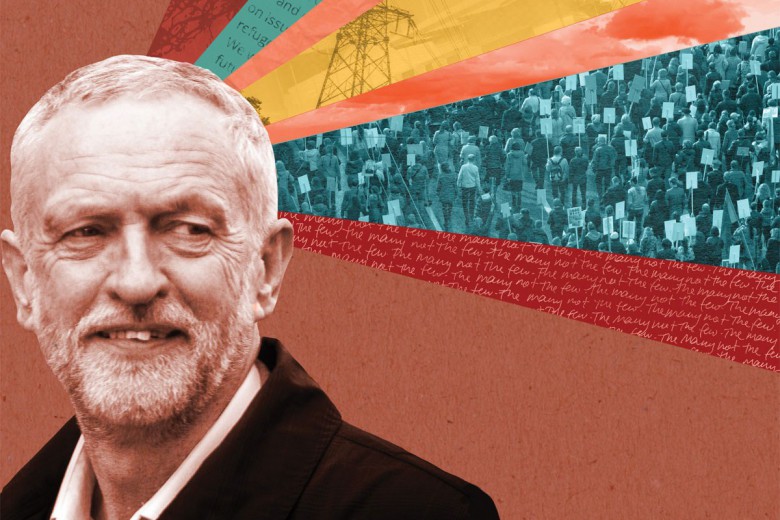There has been a surge in searches for the term socialism on the Merriam-Webster website. This is likely due to the combined effects of the vibrancy of the U.S. Democratic party primaries – in particular, Bernie Sanders’ repeated description of himself as a democratic socialist – and the high-profile election of socialist Jeremy Corbyn as leader of the U.K. Labour party.
Dictionary searches are not an accurate measure of currency in a language. We look up words that are unfamiliar, not those that are already a part of our daily lives. I fear the language of socialism is now dying, politically defanged enough to be used to name hipster bars like the Communist’s Daughter in Toronto.
Socialism has its own language, a specialized vernacular that makes other worlds conceivable. In 1906, Rosa Luxemburg wrote, “Only in the sultry air of the period of revolution can any partial little conflict between labor and capital grow into a general explosion.” Her brief statement draws on a whole language that connects a class analysis of capitalism to the idea that revolution can marshal a more equitable way of life.
But no matter how exciting, acute or evocative, if a language does not communicate beyond the circles of activists who already align with it conceptually, it is not very useful in a profoundly democratic political project.
Communities of resistance speak
The language of socialism is dying not because it is useless, but because the communities in which it once thrived have been torn apart. The language of socialism was virtually a mother tongue in mining communities, where it was passed between generations as part of an infrastructure of dissent. In the memorialized words of J.B. McLachlan, a Nova Scotia miners’ leader, “I believe in telling children the truth about the history of the world, that it does not consist in the history of Kings and Lords and Cabinets, but consists of the history of the mass of the workers.”
Yet these mining communities in which the language of socialism proliferated are now all but gone. A model example is the British miners, who mounted a tremendous strike in 1984-85 under the slogan “coal not dole” to defend their jobs and working conditions against dissolution by the Thatcher government. This strike drew on generations’ worth of mobilization experience to challenge the Thatcher government’s plan to close mines. Ultimately, the miners lost their fight. The pit villages where miners and their families once lived are now characterized by depopulation, unemployment, and low-wage labour.
The language of socialism flourished in the fertile ground of mining and industrial working-class communities, where the activists created powerful new forms of collective action that matched the rhythms of work and life. Through most of the 20th century, socialism was associated with particular kinds of work, performed mainly by men in industrial settings. The language of socialism often failed, though, to fully embrace the visions of organizing in care work, in sexualities that challenged binaries, within the cultures of resistance in communities of colour, and in Indigenous sovereignty.
Mainstreaming socialism
At its height, the language of socialism had an impact on mainstream politics. The 1933 Regina Manifesto, the founding document of the Co-operative Commonwealth Federation (CCF), forerunner of the New Democratic Party (NDP), was steeped in the language of socialism: “We aim to replace the present capitalist system, with its inherent injustice and inhumanity, by a social order from which the domination and exploitation of one class by another will be eliminated….”
This language is now gone from the party. At an NDP convention in 2013, delegates voted overwhelmingly in favour of eliminating the phrases “socialist ownership” and “democratic socialism” from its constitution’s preamble. Then-new leader Thomas Mulcair explained that the decision to soften the socialist language in the party constitution was a strategy to attract more centrist voters. Ahead of the 2015 federal election, Mulcair crystallized this strategy, centring capitalist language in the party platform: “I believe the most important economic asset Canada has is the middle class…. Today’s proposals will help our manufacturing sector and small businesses create middle-class jobs….”
Mulcair’s election campaign seemed to be dodging opponents and the mainstream media ready to label him an “old-style, tax-and-spend New Democrat.” Indeed, he was so busy proving his neoliberal credentials that he sidestepped the important socialist critiques of Conservative austerity and racism – issues the Liberals took up and reframed to resounding electoral success. But let’s not read the public reaction to the Liberals as enthusiasm for radical alternatives. I think we have to admit that if Mulcair had used the language of socialism, he would have risked sounding irrelevant and stilted.
The boot of neoliberalism
The marginalization of the language of socialism is not an accident, but the result of a deliberate project by corporations and governments to undercut working-class power by undermining the foundations of solidarity. Over the last 35 years, neoliberalism has deliberately reorganized work and life to weaken social capacities. Neoliberal politics encourage – indeed, rely on – individuals to navigate the marketplace, buying what they want and need by selling their capacity to work. Lurking under that individualism is a commitment to corporate profitability that supposedly greases the wheels of the whole market system.
These politics draw on what Stuart Hall called “the neoliberal narrative,” a way of retelling the story of the welfare state as a massive failure. But the neoliberal narrative is far more powerful than simply changing the story. It has resulted in broad changes to social policies in welfare states, with a target set squarely on emphasizing the exorbitant price tag on social goods like unions and pensions, and on undermining structural solutions to gender inequality, homelessness, and unemployment. The neoliberal narrative favours flexibility, leanness, and competitive individualism, attacking not only “dependency” on social programs, but also the “jobs for life” and “gold-plated pensions” that some unionized workers have won over time.
Every language is grounded in a way of life. It articulates the everyday practices of its speakers and is therefore an intimate expression of their work, love, suffering, passions, and dreams.
In his book Landmarks, Robert Macfarlane notes that words associated with natural phenomena are disappearing from the English language as populations become more urban. At the same time, the language has become far more supple in describing information technologies. Macfarlane believes that, as we lose our understanding about the importance of ecology, environmental policy loses its urgency.
Similarly, the loss of the language of socialism impoverishes our ability to envision a world without borders and with genuine sovereignty over the means of life.
Coding new languages of resistance
Before we get too swept away by nostalgia, we must also recognize that the language of socialism is flawed and partial. It is a language with a history of oppressive, bureaucratic forms of top-down rule. Advocates of socialism from below have faced the difficult challenge of distinguishing themselves from the
undemocratic practices embedded in the Soviet Union. Since the fall of the Berlin Wall, the language of socialism has been, for good reason, associated with undesirable forms of rule.
And yet, socialism surpasses all other languages in its ability to demonstrate the way a new world can be built out of the one we live in now. Just as Latin was transformed into French, Spanish, and Portuguese, I can only hope the language of socialism will hybridize with other tongues of freedom, including those that will emerge from agitations in the mobilizations still to come.
That means a commitment not only to speaking socialism, but to listening, learning, and building solidarities. The language of socialism has prioritized a narrow class analysis over the languages of feminism, queer liberation, anti-racism, disability activism, Indigenous sovereignty, and ecological consciousness, all of which add crucial dimensions to our resistance cultures. Class analysis must not exist in a vacuum.
Likewise, established and emerging movements can be enriched and deepened by engaging with the language of socialism. In Greece over the past few years, people have created a new solidarity movement that includes citizen-run clinics, co-operatives, and food distribution networks to fill the gaps left by pro-austerity governance. This movement has thrived because it combines the creativity of people new to activism with the analytical and organizing experience of long-time socialist activists. The result is a democratized (though still incomplete) way of doing, thinking, and speaking politics. It is in these spaces of mobilization where a new anti-capitalism emerges – one that envelops new aspects of the language of socialism, which develop through processes of experimentation and deliberate learning.
Radicals need a living language that grows from below as people seek to share their activities and learn from each other. The spirit of socialism lives on in the work of activists organizing against rampant austerity, corruption, and oppression. Just as the language of socialism framed the histories of resistance in the 20th century, so the words uttered in today’s intersectional communities of resistance will work to unseat the continuing neoliberal narrative.







